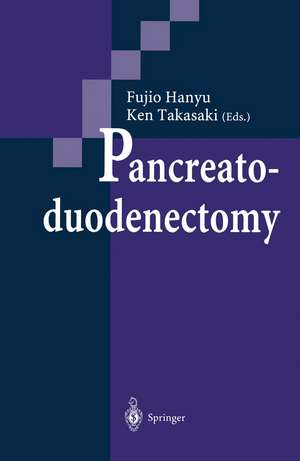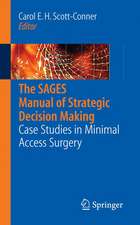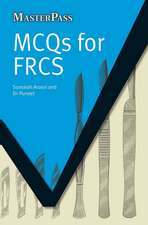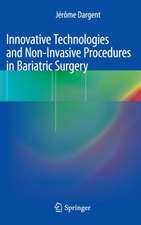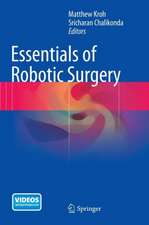Pancreatoduodenectomy
Editat de Fujio Hanyu, Ken Takasakien Limba Engleză Hardback – 31 aug 1997
Toate formatele și edițiile
| Toate formatele și edițiile | Preț | Express |
|---|---|---|
| Paperback (1) | 381.17 lei 6-8 săpt. | |
| Springer – 15 apr 2012 | 381.17 lei 6-8 săpt. | |
| Hardback (1) | 388.31 lei 6-8 săpt. | |
| Springer – 31 aug 1997 | 388.31 lei 6-8 săpt. |
Preț: 388.31 lei
Preț vechi: 408.74 lei
-5% Nou
Puncte Express: 582
Preț estimativ în valută:
74.30€ • 77.79$ • 61.48£
74.30€ • 77.79$ • 61.48£
Carte tipărită la comandă
Livrare economică 08-22 aprilie
Preluare comenzi: 021 569.72.76
Specificații
ISBN-13: 9784431701941
ISBN-10: 443170194X
Pagini: 524
Ilustrații: XVI, 508 p.
Greutate: 0.9 kg
Ediția:1997.
Editura: Springer
Colecția Springer
Locul publicării:Tokyo, Japan
ISBN-10: 443170194X
Pagini: 524
Ilustrații: XVI, 508 p.
Greutate: 0.9 kg
Ediția:1997.
Editura: Springer
Colecția Springer
Locul publicării:Tokyo, Japan
Public țintă
ResearchDescriere
Alessandro Condivilla of Bologna first attempted a resection of the head of the pan creas in 1898, but several decades of further trial-and-error attempts ensued before the prototype procedure of pancreatoduodenectomy (PD) was established by Whipple in 1935. In the half-century following that landmark, refinements of surgical technique, including pancreatico-and bilio-entero anastomosis as well as develop ment of new technology to support perioperative management and patient care have contributed to the decrease in mortality and morbidity rates for obstructive jaundice and pancreatic fistula. The improvement in mortality and morbidity rates associated with PD has led to an increase in the number of patients undergoing the procedure and in the number of institutions performing it. Indications for PD have also been expanded. In the early years after PD was established as a viable procedure, periampullary carcinoma was the most common indication; now PD is indicated for a number of benign and malignant diseases. Some surgeons believe that PD is the procedure of choice for certain types of chronic pancreatitis, pancreatico-biliary maljunction, and pancreatic and duodenal trauma. Other surgeons have reported the necessity of PD for lymph node dissection of gallbladder carcinoma. Consequently, the basic procedure has been greatly modi fied to accommodate the specific conditions of each disease. For patients with malig nancy, extended procedures have been developed to improve the curative resection rate and ensure complete lymph node dissection.
Cuprins
Historical Aspects.- Historical Aspects and the Future of Pancreatoduodenectomy.- One Thousand Pancreatoduodenectomies.- One Thousand Pancreatoduodenectomies at a Single Institution.- Pancreatoduodenectomy for Benign Disease Indications and Results.- Pylorus-Preserving Pancreatoduodenectomy with a Newly Devised Reconstruction of the Alimentary Tract.- Pancreaticoduodenectomy for Benign Pancreatic Diseases: Surgical Management of Chronic Pancreatitis.- Long-Term Follow-Up Study After Pancreatoduodenectomy for Benign Periampullary Disease.- The Role of Pancreatoduodenectomy in the Management of Complex Pancreatic Trauma.- Long-Term Results Following Pylorus-Preserving Pancreatoduodenectomy for Chronic Pancreatitis.- Pancreatoduodenectomy for Benign Disease: Indication and Results.- Pancreatoduodenectomy for Cancer Indications and Results.- Pancreatectomy for Small Carcinoma of the Head of the Pancreas.- Surgical Results of Pancreatoduodenectomy for Disease in the Pancreatic Head Region.- Indications for Extended Radical and Pylorus-Preserving Whipple Operation for Pancreatic Cancer.- Pylorus-Preserving Pancreatoduodenectomy for Cancer: Is It an Adequate Operation.- The Oncological Approach of Pylorus-Preserving Pancreatoduodenectomy for Malignancies.- Techniques for Extended Pancreatoduodenectomy.- Extended Resection Combined with Intraoperative Radiotherapy.- Extended Pancreatoduodenectomy for Adenocarcinoma of the Pancreatic Head.- The Long-Term Survival of Patients with Ductal Carcinoma of the Pancreatic Head and Body.- Extended Radical Pancreatoduodenectomy for Carcinoma of the Head of the Pancreas.- Pylorus-Preserving Pancreatoduodenectomy by the Imanaga Procedure for Pancreatic and Periampullary Cancer.- Hepatopancreatoduodenectomy for Biliary Cancer.- Hepatoligamentopancreatoduodenectomy in Patients with Advanced Gallbladder Carcinoma.- Pancreatoduodenectomy for Cancer: Technique, Complications, and Results.- Studies of Surgical Resection and Intraoperative Radiotherapy in Carcinoma of the Pancreas.- Resection of the Superior Mesenteric-Portal Vein Confluence During Pancreaticoduodenectomy.- Extended Duodenopancreatectomy: Is More Better? Commentary.- Duodenum-Preserving Pancreatoduodenectomy.- Duodenum-Preserving Total Pancreatic Head Resection with Preservation of the Vascular Arcades for Benign Lesions or Low-Grade Malignancies.- Surgical Procedure of Complete Duodenum-Preserving Pancreatoduodenostomy with Preservation of the Biliary Tract.- Duodenum-Preserving Total Resection of the Head of the Pancreas with Pancreaticocholedochoduodenostomy.- Duodenum-Preserving Resection of the Head of the Pancreas in Patients with Chronic Pancreatitis or Low-Grade Malignancy.- Duodenum-Preserving Head Resection: A Standard Operation for Chronic Pancreatitis.- Duodenum-Preserving Total Pancreatectomy.- Reconstruction after Pancreatoduodenectomy.- Pancreatojejunostomy by Duct-Insertion Method: Clinical and Experimental Study.- Isolated Pancreatoduodenectomy and Imanaga’s Procedure for Carcinoma of the Pancreatic Head Region.- Pancreaticojejunostomy After Normal Soft Pancreaticoduodenectomy: A Study of the No-Stent Method.- Reconstruction after Pancreatoduodenectomy.- Quality of Life After Pancreatoduodenectomy.- A Comparison of Quality of Life: Standard Versus Pylorus-Preserving Pancreatoduodenectomy.- Assessment of Quality of Life After Pancreatoduodenectomy.- Quality of Life of Recurrence-Free Patients After Pancreatoduodenectomy for Periampullary Cancer: A Statistical Comparison with Healthy People Without Surgery and Patients After Subtotal and Total Gastrectomy for Early Gastric Cancer.- Pylorus-Preserving Pancreatoduodenectomy for Severe Complications of Chronic Pancreatitis.- The Comparison of Long-Term Results of Pylorus-Preserving Pancreatoduodenectomy Versus Standard Whipple.- Experience of Pancreatoduodenectomy in Various Countries.- Pancreaticoduodenectomy in the United States.- Pancreatic Cancer: A London Perspective: The British Experience of Pancreatic Surgery for Cancer.- Total Pancreatectomy and Subtotal Duodenopancreatectomy for the Management of Carcinoma of the Head of the Pancreas: An Institutional Experience and Evolving Trends.- Complications After Pancreaticoduodenectomy: Analysis of Risk Factors, Their Incidence, and Possible Prevention in Italy.- Pattern of Recurrence After Pancreaticoduodenectomy for Exocrine Pancreatic Cancer: Correlation with Survival.- Results of Pancreaticoduodenectomy for Periampullary Carcinoma and Analysis of Prognostic Factors for Survival.- Clinical Analysis of 100 Cases of Pancreaticoduodenectomy.- Pancreaticogastrostomy for Reconstruction of Pancreatic Stump After Pancreaticoduodenectomy in Ampullary Carcinoma: Experience in 125 Cases.- Pancreatoduodenectomy for Periampullary Carcinoma: Experience with 320 Cases.- Pancreatoduodenectomy in Seoul National University Hospital.- Pancreaticoduodenectomy in Hong Kong: An Audit of the Queen Mary Hospital Experience.- Epidemiology and Experience in Pancreatic Cancer in Chile.- Multimodality Treatment of Pancreatic Duct Carcinoma: A Prospective Randomized Study.- Experience and Problems of Pylorus-Preserving Pancreatoduodenectomy.- Three Decades of Progress in Surgery for Primary Liver Cancer.- Keyword Index.
